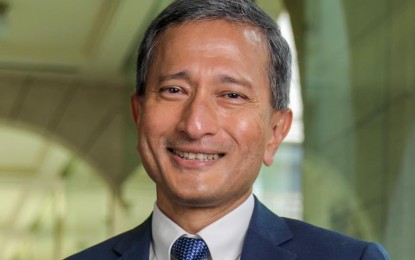
Singapore Foreign Minister Vivian Balakrishnan (Photo courtesy of Minister Balakrishnan Facebook)
MANILA – Singapore warned that the escalation of tensions or military actions in the South China Sea (SCS) would disrupt trade and heavily impact decades worth of growth in the region, specifically among Association of Southeast Asian Nations (ASEAN) member states.
While not a claimant country, Foreign Minister Vivian Balakrishnan on Tuesday said Singapore is concerned over the developments and a potential breakout of conflict in the area.
“Although Singapore has no claims in the South China Sea, the moment you have escalation of tension or collisions or military action in the South China Sea, it will immediately impair and impede trade. It will increase insurance premiums,” he said after a bilateral meeting with Foreign Affairs Secretary Enrique Manalo at Sofitel Philippine Plaza Hotel in Pasay City on Tuesday.
“It will certainly have an inflationary impact on our economies and it will dampen confidence in what in fact should be multiple decades of growth and progress that we all expect and that our people need in order for us to achieve the economic transformation and the expansion in jobs,” he added.
Balakrishnan said Singapore would not take sides in the maritime rows but called on all parties to prioritize preserving peace and stability.
He also defended ASEAN’s supposed failure to issue a unified stance against Beijing’s aggressive actions in the South China Sea.
He said not all ASEAN states are party to the maritime disputes but this does not mean that the bloc as a whole has no stake in what happens in the area.
“[T]he most important thing for the whole of ASEAN is to maintain peace and stability in the South China Sea because not is it only our immediate backyard but it is also one of the world's busiest waterways,” he said.
Manalo echoed this and explained that ASEAN texts are shaped by the “slight nuances and positions” of its members.
“We cannot always have the text that we want, but there's always been an ASEAN statement expressing concern over developments in the South China Sea, and we know which country has really caused most of those developments,” he said.
United
Balakrishnan expressed belief that the ASEAN is united on the issue of South China Sea as reflected with the ongoing negotiations on a South China Sea code of conduct (COC).
Despite the varying level of relations between its member states and the major powers, the diplomat said the ASEAN exerts effort to manage tensions as one bloc.
“Each member of ASEAN, each of us may have slightly different levels of proximity in terms of strategic alignment with one or the other but I believe ASEAN is united in the sense that no single ASEAN country wants to become a proxy or vassal state of any power,” he said.
“So, you need to be able to deal with this variety internally, as well, as the diversity of our approaches externally but still recognize that we want to maintain unity, cohesion, and the centrality of ASEAN,” he said.
Balakrishnan said the COC would not resolve the issue of sovereignty but would at least set guidelines to reduce the possibility of complications if collisions or disputes occur.
On maritime entitlements, meanwhile, the Singaporean top diplomat said ASEAN thinks that the United Nations Convention on the Law of the Sea (UNCLOS) already “sets out a pretty comprehensive statement of how maritime entitlement should be established and maintained.”
“I think on that there's no question -- ASEAN is certainly united on the importance of UNCLOS,” he said. (PNA)
